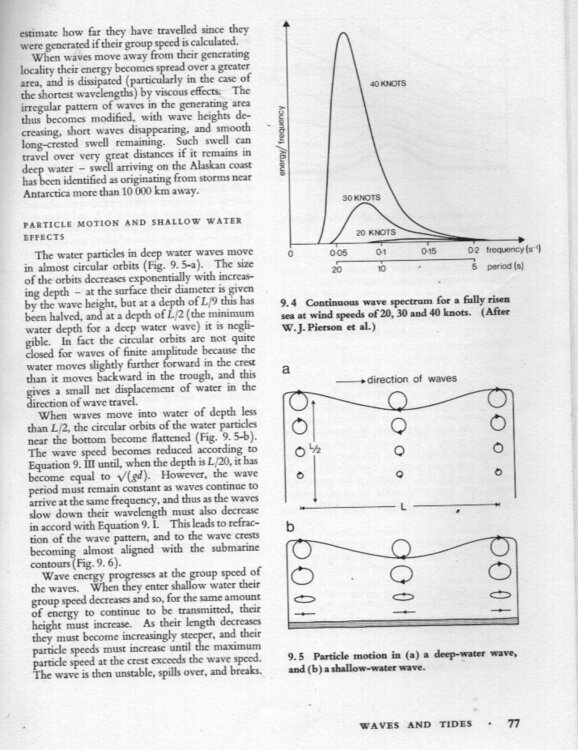Everything posted by studiot
-
A math and science theory I came up with
Pity you didn't write it here as nobody will look at your g-drive. Do you know what linear algebra and group theory mean ?
-
Quantum light breakthrough
In exactly what way is 9,700,000,000,000 Hz an odd frequency ?
-
Some good news on the renewable energy front.
'Secret' underground energy could heat every home in capital cityImage source, Getty Images Image caption, There could be an untapped resource under everyone's feet in Wales' capital that could lead to cheaper heating bills ByDani Thomas BBC Wales Published 5 November 2025 270 Comments Updated 5 hours ago On an unassuming street in Cardiff, engineering geologist Ashley Patton is lifting the lid on what looks like an ordinary drain cover. https://www.bbc.co.uk/news/articles/cy5q9e1e4zpo I expect @Ken Fabian will be interested in this.
-
Flood of Spam 12th July 2025: Why Would Someone Do That?
Tiny things please tiny minds. But unfortunately they may also have huge effect on ordinary folks.
-
Flood of Spam 12th July 2025: Why Would Someone Do That?
Don't reply. PMs avoid the 5 post limit.
-
Simplifying SR and GR with Relational Geometry — Algebraic Derivations Without Tensors. Testing and discussion.
From zero assumptions to minimal assumptions eh ?? Please make up your mind. Yet you make an assumption when you write Because that is not what I asked. I would be very happy to discuss metrics if you were prepared to answer any of my questions concerning metrics. The rest of your response leads me to think that you do not know what a metric is. A metric is a noun and as such it is the rule part of a function or mapping from it's domain set to the co- domain ( which is the union of the positive real numbers and zero.) It is unfortunate that different (scientific ) disciplines use different definitions and that we actually have a recent current thread discussing that very subject. Because most sets will admit many different metrics we also do what English does well and use the word metric as an adjective to distinguish these. In particular in GR we define the metric tensor, which means we must also have predefined certain other structure on our domain set. This is why, I keep saying, you need to start at the beginning not in the middle. Perhaps you would like to go back and read those offers properly - Then you would be able to see how we build up from simple set theory to a domain set such as you and KJW are discussing that has enough structure to actually describe our observations of the world around us. To be quite clear I contend that you are displaying a metric by using graph paper and placing numbers on it, as well as some greek letters you are squaring (and Q if you must). A final point. Invariants are not the same as metrics, both in the sense of Physics and of Mathematics. A really useful proceedure is to divide the extra structure you are imposing on the domain in the following way. The equations of constitution and the equations of compatibility. 'The equations' is a term from applied maths. We could equally generalise to the realtions of since some are not in the form of an equation. For instance the second law of thermodynamics and the uncertainty principle are both in the form of an inequality. A simple example to make this clear would be the physics and maths of the flow of an incompressible fluid. The equations of constitution are the Physics and describe relations between variables such as velocity, pressure, and so on. The equation of compatibility is geometric in nature and relies on an invariant - the volumetric flow rate - usually denote Q. At all points in the flow system Q must be the same that is constant , as the flow is incompressible. Compatibility gives us an equation relating the cross section at any place with the velocity at that section - a geometric constraint.
-
Simplifying SR and GR with Relational Geometry — Algebraic Derivations Without Tensors. Testing and discussion.
Assuming that you actually answer my last question here is my next one. Is is possible to do without assumptions ? Even the statement 'There are no prior assumptions' is an assumption itself.
-
Flood of Spam 12th July 2025: Why Would Someone Do That?
Well we really want to brainstorm anything we can think of to lighten your load. We are all very grateful for the work you put in without having extra. I'd cheerfully lend you my 4 barrelled Mossberg and a box of Ghostbusters anti slime cartidges (if I had one) 😄
-
Flood of Spam 12th July 2025: Why Would Someone Do That?
Yes its pretty clear what's happening and also pretty clear how to spot the majority of these (by repetition) so shunting them off to a holding cache pending clearance should be relatively simple in this day of extra cheap memory/temp storage space.
-
Simplifying SR and GR with Relational Geometry — Algebraic Derivations Without Tensors. Testing and discussion.
... and so on... Was there another one that I missed? Was there another one that I missed? You response to my last post is a prime example. It contains just one question. In English we identify questiony by the question mark symbol ??????????????? I would be very happy to discuss metrics if you were prepared to answer any of my questions concerning metrics. I also said questions - which in English is a plural. Each reply of your seems to respond to one easy statement/question only, leaving the hard ones untouched.
-
Simplifying SR and GR with Relational Geometry — Algebraic Derivations Without Tensors. Testing and discussion.
I don't see how I can contribute further if you will not answer my key questions. Like it or not Your post above has a metric. Please also tell me how you can arive at (anything)2, without a metric ? It is quite possible to do some geometry, and even more topology, without a metric. Such geometry uses similarity transformations, which do not need one.
-
New views on protons
Good morning jianming. Welcome. Although I am not a particle physicist this looks interesting but please note two things. 1 You are allowed 5 posts in your first 24 hours. After that posting is normal 2 It is a requirement of this site to post material for discussion on the site. Since I find this interesting, but lost amongs the spam, I will make a start for you by posting your abstract for other members to assess.
-
A age long debate
FYI https://scienceforums.net/topic/29763-bannedsuspended-users/page/40/
-
UK carbon capture/subsea injection project
Interestingly the compare on our local radio just described here student days working night shift in a tomato packing factory assiciated with Drax. Apparantly they used hot water from the power station, I think in assisting the tomato ripening. There should be more of this type of integration/coordination.
-
Simplifying SR and GR with Relational Geometry — Algebraic Derivations Without Tensors. Testing and discussion.
This is exactly what I mean when I say you have not started in the beginning. Please define mathematically what you mean by both energy and metric. Note you definition/derivations should be clean of depracatory comparisons with something else. Otherwise you are not starting with an agreed basis.
-
Propulsion by ballast...
Good evening, Ken. It would be better if you chose a more accurate numeric model for this. Here is some actual marine data. Note how the size of the circulation dies away with depth and the relationship between wavelength and rotational diameter.
-
Is all belief irrational?
Will it rain tomorrow ? What ever happened to "My best guess" ? This whole idea is a nonsensical wast of time in my opinion.
-
What would the Platonic form of a pile of horse dung be like?
I suppose that depends whether you are a street sweeper or a rose gardener ?
-
Propulsion by ballast...
In your diagram The lift arrow represents a force The direction arrow represents well a direction or a velocity. You can't add a force to a direction or velocity, tempting though the diagram makes it seem. Further the thrust force, which aligns with horizontal only in level flight, is developed by another agent, not shown on your diagram. In the case of an aircraft, the wing is rigidly connected to the rest of the aircraft meaning that both positive and negative changes to the lift force are transmitted to each. In your case the rope can only transmit tension and goes slack if the wing if lifted up. Hydrofoils are rigidly connected to a boat for this reason. And of course for shaped hulls the force acts directly on the boat. It is however true that in flight gravity must also be taken into account and this force can often be greater than the actual thrust.
-
Why circulating electron loses energy, as in CPT perspective it is also circulating charge gaining energy instead?
I find this thread completely baffling because it is ill posed. What are you talking about ? Are you talking about quantum explanation for electrons circulating in the field of the nucleus or are you talking about the classical requirement for accelerating charge to loose energy by radiation ?
-
UK carbon capture/subsea injection project
Thanks for that info. I don't know if the Dutch elections will change the second point. +1
-
Which side will Canada be on in the forthcoming second US Civil War ?
https://www.zoylandheritage.co.uk/ The Battle of Sedgemoor was the last pitched battle to be fought on English soil. Three days after his defeat, Monmouth was captured and later executed. Hundreds of his supporters suffered at the hands of Judge Jeffreys' Bloody Assizes.
-
Will we be here again?
Nah it was 1984 😁
-
Which side will Canada be on in the forthcoming second US Civil War ?
Since the Britain is the mother of the USA and we have had several civil wars theya re surely due at least one more, I can post another of the site of the last pitched battle fought on English soil only 15 miles the other way if you prefer. I'm glad to say that this seems to be a popular thread however. 😄
-
Which side will Canada be on in the forthcoming second US Civil War ?
Many thanks to those who replied as they made me realise something I never thought of. Not all canadians will want to to do the same thing. Perhaps I should have said Canada or included Canadians. Incidentally there is a small piece of Canada near me just over the county boundary in Devon. The Maple leaf flies over Wolford Chapel, which was given to Canada on the return of the first Governor. They still hold services there and there is a visitors book. Wolford Chapel



